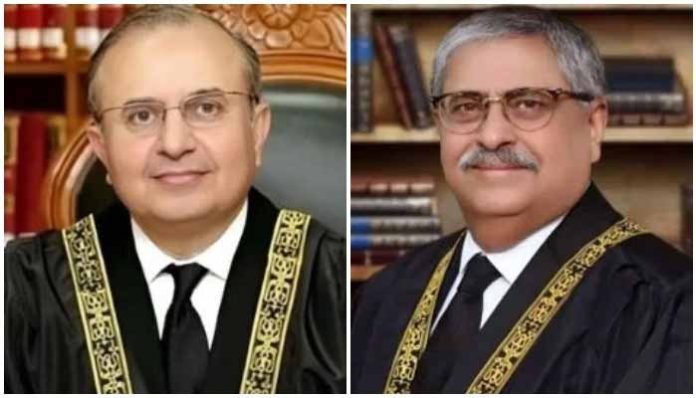Ansar Mahmood Bhatti
ISLAMABAD: – Senior puisne judge Mansoor Ali Shah and Supreme Court (SC) Justice Athar Minallah have tendered their resignations.
In this 13-page resignation letter to the President Asif Ali Zardari, Justice Mansoor termed the newly enacted 27th Constitutional Amendment a serious attack on the Constitution of Pakistan.
This development comes after President Zardari assented to the much-touted 27th Constitutional Amendment into law after approval from both houses of the Parliament.
Chief Justice Yahya Afridi is set to host a farewell reception in honour of Justice Aminuddin Khan, who will retire from the Supreme Court on November 30, marking the end of his judicial career spanning decades. The reception, to be attended by sitting and retired judges, senior lawyers, and members of the legal fraternity, will also serve as a moment of reflection amid growing speculation about key judicial appointments following the recent 27th Constitutional Amendment.
Justice Aminuddin Khan’s impending retirement had sparked speculation that he might be appointed as the next Chief Justice of the Federal Constitutional Court (FCC) a new judicial body established under the 27th Amendment. However, with his retirement from the Supreme Court imminent, those rumours appear to have been largely put to rest. Still, some legal observers believe that the possibility of his appointment cannot be entirely ruled out, as the retirement age for judges of the Constitutional Court has been extended to 68 years under the new amendment, allowing a few more years of eligibility for senior judges.
According to legal insiders, Chief Justice Yahya Afridi himself is now seen as a strong contender for the position of Chief Justice of the newly created Constitutional Court. If Justice Afridi is indeed elevated to the Constitutional Court, Justice Muhammad Ali Mazhar is likely to become the next Chief Justice of Pakistan.
The passage of the 27th Amendment has already generated a storm of political and legal controversy. While the government has hailed it as a transformative step toward restructuring the judicial system, critics argue that several provisions appear inconsistent with Islamic principles and the spirit of the Constitution. Among the most contentious clauses is the grant of lifetime immunity to the President and other key officials a provision that legal experts claim is in direct conflict with Islamic injunctions and the concept of equality before law.
Prominent jurists and constitutional lawyers have predicted that the matter will soon be challenged in the superior courts, setting the stage for another major constitutional battle. “No law can override the principles of Islam as enshrined in the Constitution of Pakistan. Lifetime immunity to any public office-holder is not only unconstitutional but also un-Islamic,” said a senior constitutional lawyer.
Many within legal circles view the inclusion of the immunity clause as a political maneuver aimed at securing President Asif Ali Zardari’s support for the amendment. According to sources, the government and its backers were fully aware that such a clause would not withstand judicial scrutiny but chose to include it as a “sweetener” to win the President’s consent and ensure the smooth passage of the amendment.
“The immunity clause is a calculated risk,” said another analyst. “It’s likely to be struck down by the courts, but for now it has served its political purpose bringing all key stakeholders on board for the passage of the 27th Amendment.”
The broader implications of the amendment are still being debated. While it establishes new judicial structures such as the Federal Constitutional Court to adjudicate constitutional disputes, it also raises questions about jurisdictional overlap, separation of powers, and the future role of the Supreme Court. Some lawyers warn that the creation of parallel judicial forums could weaken the authority of the apex court and politicize the appointment process further.
Meanwhile, within the judiciary, quiet discussions are underway regarding upcoming leadership transitions. With Justice Aminuddin Khan’s departure the coming weeks are expected to bring significant reshuffling at the top of Pakistan’s judicial hierarchy.

















